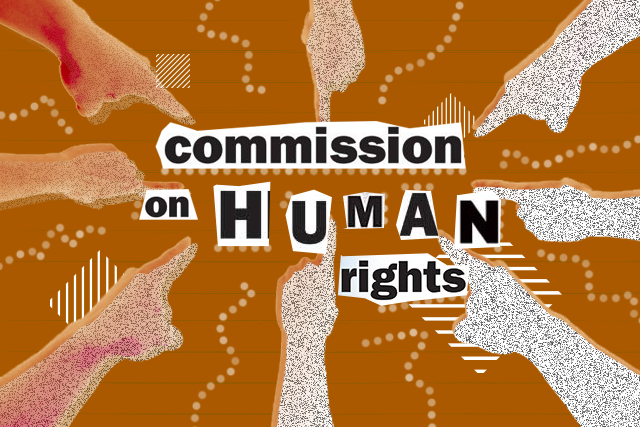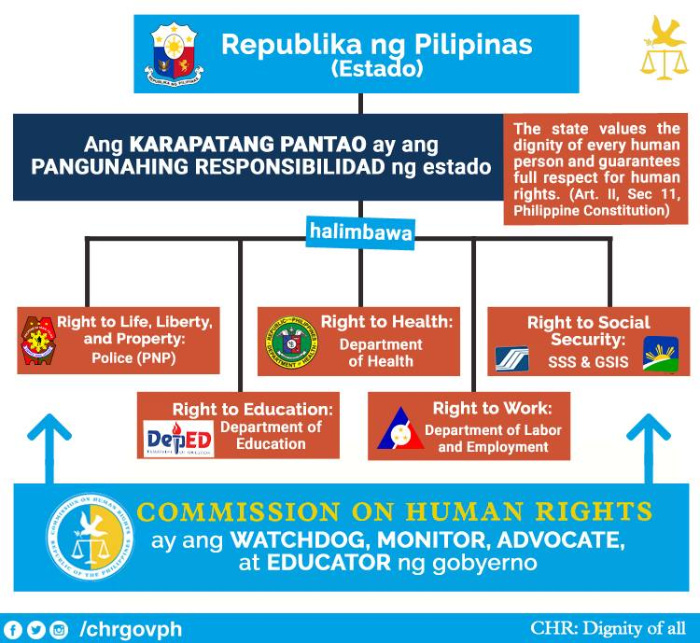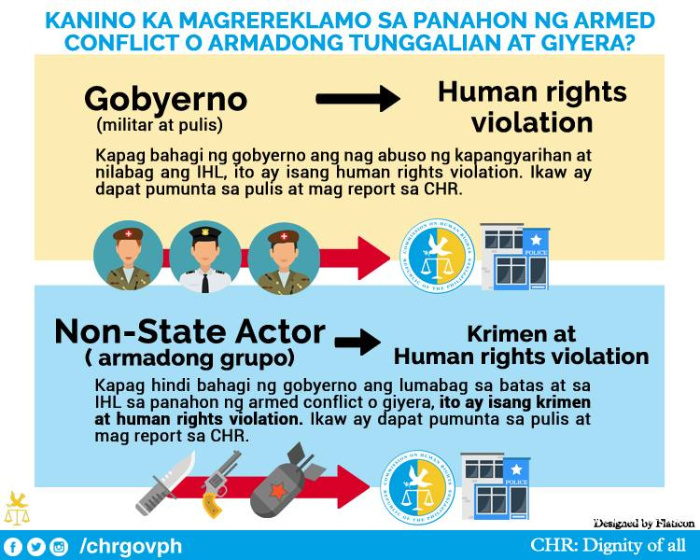
The Commission on Human Rights released an infographic on social media to explain its mandate in response to criticisms from some Filipinos following the case of the murdered 16-year-old in Cebu.
The agency stated that its duty is to ensure the government does not commit violations against human rights in implementing policies and directives.
“The Commission is mandated to conduct investigations on human rights violations against marginalized and vulnerable sectors of the society, involving civil and political rights,” its website reads.
In its recently released infographic, the CHR cited other government agencies tasked to protect specific human rights as enshrined in the 1987 Constitution. It reminds Filipinos that human rights are ideally protected by the whole of government, not by the CHR alone.

It noted, for one, that it is the Philippine National Police’s mandate to protect the “right to life, liberty and property,” such as in preventing and securing justice for crimes.
The “right to health,” meanwhile, is the jurisdiction of the Department of Health, while the “right to education” should be, of course, secured by the Department of Education.
CHR’s primary function, according to law
Under the Constitution, the CHR acts upon the provision stated on Article 2, Section 2 which declares that “the State values the dignity of every human person and guarantees full respect for human rights.”
“It is the mandate of CHR to ensure that there are no abuses or shortcomings committed by the government in implementing the rights of people, most particularly the vulnerable sector,” they said in Filipino.
“But if it is the state that violated the human rights, it is the responsibility of the CHR to act as the conscience of the government,” the agency continued.
Other agencies such as the Philippine National Police, the Department of Health, the Social Security System, the Government Service Insurance System, the Department of Education and the Department of Labor and Employment adhere to different constitutional mandates.
The CHR also mentioned instances whenever it should be approached to oversee a matter.
“If a civilian or a private person has committed crimes such as murder, rape and such, it is the duty of the Philippine National Police or PNP to act on the matter since they are the ones mandated to protect people and suppress crime,” they explained.

‘Nasaan ang CHR?’
Yet the CHR still spoke up against the killing of a 16-year-old in Lapu-Lapu, Cebu in a statement on March 13, Tuesday, a day before they shared it released an infographic on social media.
“We once again express our anguish, condemnation and deepest condolences to the extremely tragic murder of 16-year-old Christine Lee Silawan of Lapu-Lapu City,” the rights body said in Filipino.
The agency mentioned that it immediately responded to the matter and sent its personnel to help the authorities monitor the case.
“We immediately sent a Quick Response Team on March 11, 2019 to fully ensure a swift investigation of the matter. It is our desire to make the perpetrators accountable and let them feel the force of the law,” part of its statement reads.
The agency also reminded the public to be vigilant in browsing social media, especially as authorities attempt to solve the 16-year-old’s case.
CHR has been receiving criticisms on its actions and initiatives ever since they aired its opposition against the administration’s policy on the anti-narcotics campaign that led to the killing of thousands of supposed suspects in police operations outside trial.
President Rodrigo Duterte threatened in July 2017 to abolish the constitutional commission, although he eventually backpedaled and said that it was only a joke.
“And when the time comes, ‘yung CHR, ‘yung opisina dito (that CHR, that office), you are better abolished… I will not allow my men to go there to be investigated,” Duterte said at a press briefing following his second State of the Nation Address.
“Remember this, Human Rights Commission, you address your request through me because the Armed Forces is under me and the police is under me,” he continued.
The chief executive under the Constitution cannot dissolve the agency as it would require amendments to the supreme law. — Artwork by Uela Altar-Badayos









